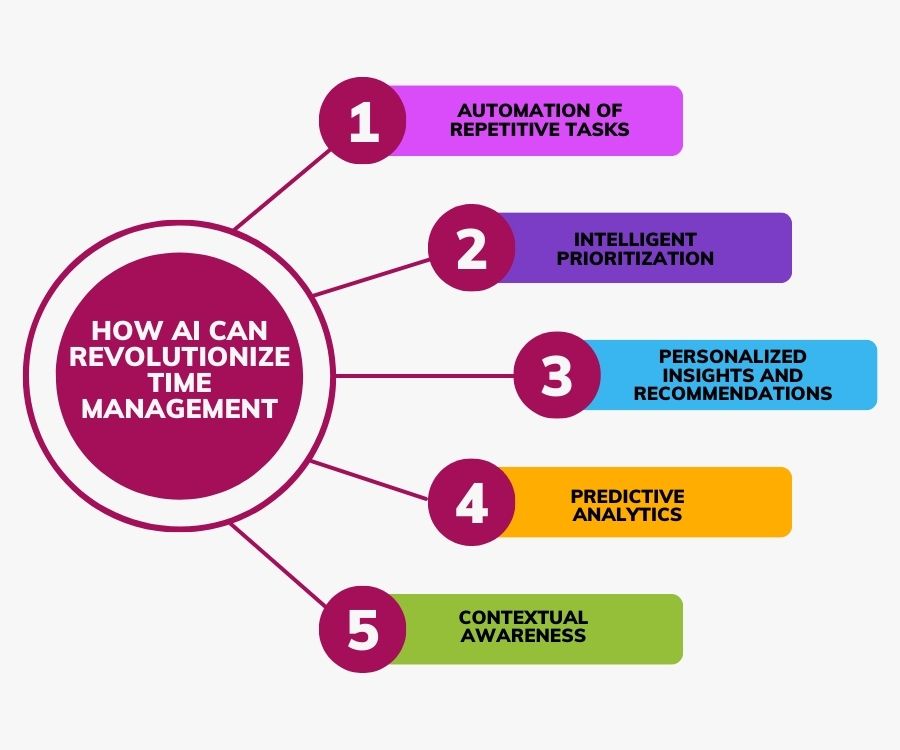The importance of time management for busy professionals
In the fast-paced world of today, time is a precious commodity that can make or break our success. As busy professionals, we often find ourselves juggling multiple tasks, deadlines, and responsibilities, leaving little room for inefficiencies or wasted time. Effective time management is crucial for maintaining productivity, reducing stress, and achieving a healthy work-life balance. However, mastering this skill can be a daunting challenge, especially in an era where distractions and interruptions are ubiquitous.
Time management is not just about cramming more tasks into our schedules; it’s about prioritizing our efforts, eliminating unnecessary activities, and streamlining our workflows. By taking control of our time, we can increase our focus, boost our efficiency, and ultimately accomplish more in less time. This, in turn, leads to greater job satisfaction, reduced burnout, and a better quality of life.
As we navigate the complexities of modern work, we must embrace innovative solutions that can help us optimize our time and maximize our productivity. One such solution is the integration of artificial intelligence (AI) into our time management strategies. AI has the potential to revolutionize the way we approach time management, offering powerful tools and insights that can help us work smarter, not harder.
Understanding AI and its role in time management
Artificial intelligence (AI) is a rapidly evolving field that involves the development of intelligent machines and computer systems capable of performing tasks that typically require human intelligence. AI has already transformed various industries, from healthcare to finance, and its applications are continuously expanding.
In the context of time management, AI can play a pivotal role by automating repetitive tasks, providing intelligent recommendations, and analyzing data to identify patterns and inefficiencies. By leveraging AI, we can offload mundane activities and focus our attention on more critical and creative endeavors.
AI-powered time management solutions can learn from our behavior, preferences, and past experiences, enabling them to provide personalized recommendations and insights. These intelligent systems can analyze our schedules, prioritize tasks based on urgency and importance, and even suggest the most productive times to tackle specific activities.
Furthermore, AI can assist in managing distractions and interruptions, which are significant time thieves in our modern work environments. By monitoring our digital habits and providing gentle reminders or blocking distracting websites or applications, AI can help us stay focused and productive throughout the day.
How AI can revolutionize time management
The integration of AI into our time management strategies has the potential to revolutionize the way we approach productivity and efficiency. By harnessing the power of intelligent algorithms and machine learning, AI can transform our time management practices in several ways:
- Automation of Repetitive Tasks: AI can automate mundane and repetitive tasks, freeing up valuable time for more important and creative work. From scheduling appointments to managing email inboxes, AI can handle these tasks efficiently, reducing the burden on busy professionals.
- Intelligent Prioritization: AI can analyze our schedules, tasks, and priorities, and provide intelligent recommendations on what to focus on and when. By taking into account factors such as deadlines, importance, and our personal preferences, AI can help us prioritize our workload effectively.
- Personalized Insights and Recommendations: AI systems can learn from our behavior, habits, and past experiences, enabling them to provide personalized insights and recommendations tailored to our unique needs and preferences. This can help us identify areas for improvement and make informed decisions about how to optimize our time.
- Predictive Analytics: By analyzing historical data and patterns, AI can predict potential bottlenecks, conflicts, or inefficiencies in our schedules. This allows us to proactively address issues before they occur, minimizing disruptions and ensuring smoother workflows.
- Contextual Awareness: AI can leverage contextual information, such as our location, calendar events, and communication patterns, to provide relevant and timely assistance. For example, it can suggest the most productive times for focused work based on our typical energy levels and meeting schedules.

By embracing AI-powered time management solutions, we can unlock new levels of productivity, efficiency, and work-life balance. However, it’s important to remember that AI is a tool to augment and enhance our capabilities, not replace human decision-making and creativity.
Top productivity tips for busy professionals
As we explore the potential of AI in revolutionizing time management, it’s essential to combine these powerful tools with proven productivity strategies. Here are some top tips for busy professionals to maximize their productivity:
- Prioritize and Focus: Identify your most important tasks and priorities, and allocate dedicated time for focused work on these activities. Eliminate distractions and multitasking, as they can significantly reduce productivity.
- Batch Similar Tasks: Group similar tasks together and tackle them in batches. This minimizes context-switching and allows you to enter a state of flow, increasing your efficiency and focus.
- Leverage the Power of Planning: Start each day or week by creating a realistic plan and schedule. Break down larger projects into smaller, actionable steps, and allocate time accordingly.
- Embrace Time-Blocking: Dedicate specific blocks of time to specific tasks or projects. This helps you stay focused and prevents tasks from spilling over into other areas of your schedule.
- Take Breaks and Recharge: While it may seem counterintuitive, taking regular breaks can actually boost your productivity. Use these breaks to recharge, stretch, or engage in a brief activity that refreshes your mind.
- Eliminate Time Wasters: Identify and eliminate activities that drain your time without adding value. This could include excessive meetings, unnecessary email checking, or social media distractions.
- Leverage Productivity Tools: Explore and utilize productivity tools and apps that can help you streamline your workflows, automate tasks, and stay organized.
- Practice Self-Discipline: Effective time management requires self-discipline and the ability to stick to your plans and schedules. Develop habits and routines that support your productivity goals.
- Continuous Learning and Improvement: Regularly assess your time management strategies and be open to learning new techniques or adopting new tools. Continuously strive to improve and refine your approach.
- Seek Support and Accountability: Surround yourself with a supportive network of colleagues, mentors, or accountability partners who can offer guidance, feedback, and motivation.
By combining these productivity tips with the power of AI, you can unlock new levels of efficiency and effectiveness in your professional life.
Utilizing AI-powered tools for time management
As we explore the potential of AI in revolutionizing time management, it’s crucial to understand the various AI-powered tools available and how they can enhance our productivity. Here are some examples of AI-powered tools that can streamline your time management:
- Intelligent Scheduling Assistants: AI-powered scheduling assistants, such as x.ai or Clara, can handle the tedious task of scheduling meetings and appointments. These tools can communicate with participants, negotiate available time slots, and automatically update calendars, saving you valuable time and effort.
- Task Management and Prioritization Tools: AI-powered task management tools, like Trello or Asana, can help you prioritize tasks based on importance, deadlines, and contextual information. They can also provide intelligent recommendations on the most efficient order to tackle tasks, ensuring you focus on the most critical items first.
- Email Management and Triage: AI-powered email management tools, such as MyWorker Ai or Astro, can help you tame your inbox by automatically sorting, prioritizing, and categorizing emails based on their importance and relevance. This can save you from the time-consuming task of manually sifting through a cluttered inbox.
- Virtual Assistants: Virtual assistants powered by AI, like Siri, Alexa, or Google Assistant, can help you manage your schedule, set reminders, and even automate routine tasks like sending emails or creating calendar events. By leveraging voice commands, you can multitask and stay productive without being tethered to your devices.
- Productivity Tracking and Analytics: AI-powered productivity tracking tools, such as RescueTime or ActivTrak, can monitor your digital activity and provide insights into how you spend your time. These tools can identify patterns of productivity and distraction, enabling you to make data-driven adjustments to optimize your time management.
- Intelligent Writing Assistants: AI-powered writing assistants, like Grammarly or Jasper, can help you save time by suggesting improvements to your writing, catching grammatical errors, and even generating content based on your prompts.
- Project Management and Collaboration Tools: AI-powered project management and collaboration tools, like Asana or Trello, can help teams streamline their workflows, automate task assignments, and track progress in real-time. These tools can also provide intelligent insights and recommendations to optimize team productivity.
It’s important to note that while AI-powered tools can be incredibly powerful, they should be used as aids and not as a complete replacement for human decision-making and judgment. The key is to find the right balance between leveraging AI’s capabilities and maintaining control over your time management strategies.
Prioritizing tasks and setting realistic goals
Effective time management starts with prioritizing tasks and setting realistic goals. Without a clear understanding of what needs to be accomplished and in what order, it’s easy to get sidetracked and overwhelmed, leading to decreased productivity and increased stress.
When it comes to prioritizing tasks, it’s crucial to distinguish between urgent and important tasks. Urgent tasks are those that require immediate attention, while important tasks are those that contribute to your long-term goals and objectives. Often, we find ourselves caught up in the cycle of addressing urgent tasks while neglecting important ones, which can lead to a lack of progress and a sense of stagnation.
One effective method for prioritizing tasks is the Eisenhower Matrix, which categorizes tasks into four quadrants: urgent and important, not urgent but important, urgent but not important, and neither urgent nor important. By using this matrix, you can clearly identify which tasks should take precedence and allocate your time accordingly.
Once you’ve prioritized your tasks, it’s essential to set realistic goals and deadlines. Unrealistic goals can lead to disappointment, frustration, and burnout, ultimately hindering your productivity. When setting goals, consider factors such as your available time, resources, and personal limitations.
AI-powered tools can be invaluable in helping you prioritize tasks and set realistic goals. For example, intelligent task management apps can analyze your workload, deadlines, and past performance to provide personalized recommendations on which tasks to tackle first and how to allocate your time effectively.
Additionally, AI-powered productivity tracking tools can monitor your work patterns and identify your most productive hours, enabling you to schedule important tasks during those times for maximum efficiency.
Remember, prioritizing tasks and setting realistic goals is an ongoing process that requires regular review and adjustment. As your priorities and circumstances change, be willing to adapt and refine your approach to ensure you’re always working towards your most important objectives.
Streamlining workflows with AI automation
In today’s fast-paced work environment, streamlining workflows is essential for maximizing productivity and efficiency. Repetitive, mundane tasks can consume a significant portion of our time, leaving us with less energy and focus for more critical and creative endeavors.
AI automation offers a powerful solution to streamline workflows by automating routine tasks and processes. By leveraging AI, we can offload these time-consuming activities to intelligent systems, freeing up valuable time and mental resources.
One area where AI automation can significantly impact time management is in the realm of data entry and processing. AI-powered tools can automate tasks such as data extraction from documents, data entry into spreadsheets or databases, and even generate reports based on the collected data. This not only saves time but also reduces the risk of human error, ensuring greater accuracy and consistency.
AI can also streamline workflows by automating communication and collaboration processes. For example, AI-powered virtual assistants can schedule meetings, send reminders, and even transcribe meeting notes, eliminating the need for manual coordination and note-taking.
In addition, AI can automate routine administrative tasks, such as managing email inboxes, filing documents, and updating records. By delegating these tasks to AI systems, professionals can focus their attention on higher-value activities that require human intelligence and creativity.
Another area where AI automation can be particularly useful is in the realm of customer service and support. AI-powered chatbots and virtual assistants can handle routine inquiries, freeing up human agents to focus on more complex issues that require personalized attention.
However, it’s important to strike a balance between AI automation and human oversight. While AI can streamline many workflows, there may be instances where human judgment and decision-making are still required. The key is to identify the tasks and processes that are well-suited for automation and those that require human intervention, and find the right balance between the two.
By embracing AI automation, busy professionals can significantly reduce their workload, increase their productivity, and ultimately achieve a better work-life balance.
Managing distractions and staying focused with AI assistance
In the era of constant connectivity and digital distractions, maintaining focus and avoiding distractions has become a significant challenge for busy professionals. From email notifications to social media updates, our attention is constantly being pulled in multiple directions, hindering our ability to stay focused and productive.
AI can play a crucial role in helping us manage distractions and maintain focus by providing intelligent assistance and tools tailored to our specific needs and working styles.
One way AI can assist in managing distractions is through intelligent notification management. AI-powered systems can analyze our communication patterns, priorities, and context to determine which notifications are truly important and require immediate attention. By filtering out non-essential notifications, AI can help us stay focused on our tasks without constant interruptions.
Another powerful application of AI in managing distractions is through the use of focus mode or distraction-blocking tools. These AI-powered tools can monitor our digital activity and identify patterns of distraction, such as excessive social media usage or frequent website visits. Based on this data, the tools can then automatically block or limit access to distracting websites or applications during designated focus periods, ensuring uninterrupted productivity.
AI can also assist in creating personalized productivity plans and schedules. By analyzing our work habits, energy levels, and task priorities, AI systems can recommend optimal times for focused work, breaks, and even suggest when to tackle specific tasks for maximum efficiency.
Additionally, AI-powered virtual assistants can help us stay on track by providing reminders, setting timers, and even offering gentle nudges when we veer off course. These assistants can learn our preferences and routines, enabling them to provide tailored support and guidance throughout the day.
It’s important to note that while AI can be a powerful tool in managing distractions, it should be used in conjunction with personal discipline and self-awareness. By combining AI assistance with mindful practices, such as setting clear boundaries, practicing mindfulness, and prioritizing self-care, we can create a holistic approach to managing distractions and maintaining focus.
Tracking and analyzing time usage with AI technology
Effective time management requires a deep understanding of how we actually spend our time. Without accurate data and insights, it’s challenging to identify areas for improvement and make informed decisions about optimizing our productivity.
AI technology offers powerful tools for tracking and analyzing our time usage, providing valuable insights that can help us make data-driven decisions about our time management strategies.
One way AI can assist in tracking time usage is through intelligent time-tracking applications. These apps can automatically monitor and log the time spent on various tasks, projects, and applications, eliminating the need for manual time entry. By leveraging AI and machine learning algorithms, these tools can even categorize and label activities based on their context and patterns, providing a detailed breakdown of how our time is being allocated.
In addition to tracking time usage, AI can also analyze this data to identify patterns, trends, and inefficiencies. By applying advanced analytics and machine learning techniques, AI systems can uncover insights that may not be immediately apparent to the human eye. For example, AI could identify periods of low productivity, highlight recurring distractions, or pinpoint tasks that consistently take longer than expected.
These insights can be invaluable in helping us make informed decisions about how to optimize our time management strategies. For instance, if AI identifies that we tend to be most productive in the morning hours, we can adjust our schedules to tackle our most important tasks during that time. Alternatively, if AI reveals that we spend an excessive amount of time in meetings or responding to emails, we can explore strategies to streamline these activities or delegate them when possible.
AI can also provide personalized recommendations and actionable steps based on the analyzed data. For example, it could suggest blocking off specific time slots for focused work, recommend productivity tools or techniques tailored to our work styles, or even suggest adjustments to our daily routines to maximize efficiency.
By leveraging AI technology for tracking and analyzing our time usage, we can gain a deeper understanding of our work habits, identify areas for improvement, and make data-driven decisions to optimize our time management strategies.
Integrating AI into your time management routine
Integrating AI into your time management routine can be a game-changer for busy professionals seeking to maximize their productivity and efficiency. However, it’s important to approach this integration thoughtfully and strategically to ensure a seamless and effective experience.
One key aspect of integrating AI into your time management routine is to start small and gradually introduce AI tools and solutions. Begin by identifying specific areas or tasks where AI could provide the most significant impact, such as scheduling meetings, managing your inbox, or automating routine administrative tasks. Implement one or two AI tools in these areas and take the time to learn and adapt to their capabilities before expanding further.
As you become more comfortable with AI-powered time management tools, explore ways to integrate them into your existing workflows and routines. Look for opportunities to automate repetitive tasks, streamline processes, and leverage AI’s intelligent recommendations and insights. This could involve setting up automated reminders, using AI-powered task prioritization, or incorporating AI-powered virtual assistants into your daily routine.
It’s also crucial to be open to adapting and refining your time management strategies as you integrate AI. Be willing to experiment and adjust your approach based on the insights and data provided by AI tools. Regularly review your productivity metrics, identify areas for improvement, and make necessary adjustments to optimize your time management routine.
Collaboration and communication with your team or colleagues can also play a significant role in successfully integrating AI into your time management routine. Share your experiences, insights, and best practices with others, and encourage open discussions about the potential benefits and challenges of AI-powered time management solutions.
Additionally, consider seeking guidance or training from experts or professionals who specialize in AI and productivity. They can provide valuable advice on selecting the right AI tools, implementing them effectively, and maximizing their potential to enhance your time management strategies.
Remember, integrating AI into your time management routine is an ongoing process that requires patience, adaptability, and a willingness to learn and evolve. By embracing AI as a powerful tool to augment your capabilities, you can unlock new levels of productivity, efficiency, and work-life balance.
Conclusion
In the fast-paced world of today, effective time management is a critical skill for busy professionals seeking to achieve success and maintain a healthy work-life balance. The integration of AI technology into our time management strategies offers a revolutionary opportunity to streamline our workflows, prioritize tasks, manage distractions, and gain valuable insights into our productivity patterns.
By leveraging AI-powered tools and solutions, we can automate repetitive tasks, receive intelligent recommendations, and make data-driven decisions about how to optimize our time. From intelligent scheduling assistants and task management tools to productivity tracking applications and virtual assistants, AI provides a wide range of solutions to enhance our time management capabilities.
However, it’s important to remember that AI is a tool to augment and enhance our abilities, not replace human decision-making and creativity. By combining the power of AI with proven productivity strategies and personal discipline, we can create a holistic approach to time management that maximizes our efficiency and effectiveness.
As we embrace the future of work, the integration of AI into our time management routines will become increasingly essential. By staying open to learning, adapting, and refining our strategies, we can harness the full potential of AI to revolutionize our productivity and achieve a greater balance between our professional and personal lives.
If you’re looking to streamline your sales outreach and maximize your productivity, consider leveraging the power of MyWorker AI. Our AI-powered solution can automate various aspects of your sales process, from email outreach and follow-ups to lead nurturing and task management. By offloading these time-consuming tasks to our intelligent system, you can focus your energy on high-value activities that require human interaction and creativity. Get started with MyWorker AI today and experience the transformative power of AI in revolutionizing your time management and sales productivity.



